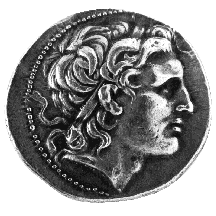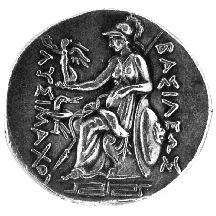



(45) Thrace, Lysimachos - AR tetradrachm, 297 - 281 B.C., 17.09
g. (inv. 91.046).
Obverse: Head of Alexander r., with diadem and Ammon horns.
Reverse: Athena Nikephoros seated l. with spear and shield,
holding Nike in r.; in l. field, torch; in exergue, maeander; ![]()
![]() :
of King Lysimachos.
:
of King Lysimachos.
Provenance: Hesperia Art, 1960.
Bibliography: M. Thompson, "The Mints of Lysimachos,"
Essays in Greek Coinage Presented to Stanley Robinson (Oxford 1968)
163-182; O. Mørkholm, Early Hellenistic Coinage from the Accession
of Alexander to the Peace of Apamea (336-188 B.C.) 81.
Lysimachos was a member of the bodyguard of Alexander the Great. In the
division of the empire after Alexander's death, he was entrusted with Thrace
and adjoining territory in the Euxine, and in the Battle of Ipsos in 301
B.C. he acquired northwestern Asia Minor. Like the other successors of Alexander,
he first issued coins with the types used by Alexander, but in 297 B.C.
he created new types, among them the obverse of this coin, one of the most
influential images in Hellenistic coinage.
The head is a portrait of the deified Alexander, with the royal diadem and
the ram's horns that identify him as the son of Zeus Ammon. Lysimachos thus
portrays Alexander as both his political ancestor and his patron god. The
coins were issued at many mints (the maeander on the reverse indicates that
this coin was issued at Magnesia-on-Maeander; see no. 48),
and their Alexander portrait type with its divine attributes provided the
prototype for depictions of divine rulers in later Hellenistic coinage.
The coins continued to be issued after the death of Lysimachos and in some
areas were as common as posthumous coins of Alexander.
The reverse refers more specifically to Lysimachos. In her right hand, a
seated Athena extends her Nike, who crowns the first letter of Lysimachos'
name. The gesture is a probable reference to his victory at Ipsos. The lion's
head on Athena's shield may also refer to Lysimachos; the forepart of a
lion was his personal device. He participated in lion hunts with Alexander
and supposedly once killed a lion with his bare hands.
K.J.B.



All contents copyright (c) 1996.
Lawrence University
All rights reserved.